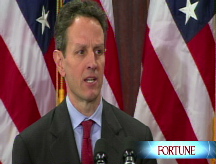High-wire act
Can the Obamoids balance the interests of both taxpayers and Wall Street?
NEW YORK (Fortune) -- Watching the Obama administration deal with Wall Street is like watching the New York Yankees deal with their star third baseman, Alex Rodriguez, who recently admitted to having used steroids.
To appease their fans, the Yankees have to say that what A-Rod (or A-Roid, if you prefer) did was wrong. But they don't dare void his contract and throw him off the team, because they'd be worse off without him.
The Obama administration is trying a similar balancing act with Wall Street. On the one hand, the Obamoids denounce the Street, echoing the rage felt by many of us (including me) about lavish pay packages going to people whose firms' financial excesses required a taxpayer bailout and touched off our horrible economic problems.
On the other hand, Obama and his Treasury Secretary, Tim Geithner, know they need Wall Street to help pull our economy and financial system out of the pit. So the cap they've announced on Wall Street pay is almost entirely symbolic, with little or no substance. (Here's why.)
But Street-bashing didn't stop Geithner from unveiling a Financial Stability Plan that would transfer hundreds of billions of dollars of value from taxpayers to Wall Street by providing loans and guarantees at prices well below what the financial markets would charge.
That would be on top of the endless supply of ultracheap money the Federal Reserve and Treasury have already made available to financial firms. Not to mention the cheap government investment capital they've gotten under the Troubled Asset Relief Program.
The new Financial Stability Plan itself is a balancing act too, parts of which I - unlike Wall Street, which sliced $500 billion from the stock market's value the day it was announced - actually like. For starters, the plan takes a mature approach to the question of whether banks are using bailout money to make loans, which is the point of the enterprise. Rather than demand that banks getting aid show that they've expanded their loan portfolios, the plan requires them to show that they're making more loans than they would have without the aid. That strikes me as the right way to measure things, rather than forcing banks - which already have enough bad paper on their books - to make loans they consider sketchy.
This plan also pragmatically tries to balance protecting taxpayers' interests with making sure that firms needing more government capital don't decide to risk failure rather than come back for a bailout.
It was fine for Warren Buffett to impose tough terms on Goldman Sachs (GS, Fortune 500) last September - a 10% annual dividend on $5 billion of preferred stock plus the right to buy $5 billion of common stock at the then-prevailing price. Uncle Sam, by contrast, got only a 5% dividend and warrants on 15% of the preferred stock amount from its first round of bank investments. But Buffett's job is to make money for shareholders of Berkshire Hathaway (BRKB) (who include me), not to keep the financial system going. The government's job is to balance pumping up the economy with being prudent stewards of taxpayer money, not to make the biggest possible return.
Wall Street could use some balance too - it can't do business as usual when there are millions of people losing their jobs, millions more scared they'll be next, and tens of millions worried about the carnage the market implosion has done to their retirement accounts and 529 accounts for their kids' education. Instead of paying its worker bees low salaries - low in terms of being able to afford a middle- or upper-middle-class life in the oh-so-expensive New York City area - Wall Street ought to offer higher salaries and far smaller bonuses. That would help balance Wall Street and Main Street concerns.
In an ideal world the Obama folk would have announced a brilliant, detailed recovery plan, markets would be soaring, and we'd be chanting, "Yes, we can." Alas, that didn't happen. But just as I'd settle for A-Rod leading the Yankees instead of distracting them, I'll settle for the administration getting the balance almost right. It would leave us a lot better off than we are now. ![]()
-
 The retail giant tops the Fortune 500 for the second year in a row. Who else made the list? More
The retail giant tops the Fortune 500 for the second year in a row. Who else made the list? More -
 This group of companies is all about social networking to connect with their customers. More
This group of companies is all about social networking to connect with their customers. More -
 The fight over the cholesterol medication is keeping a generic version from hitting the market. More
The fight over the cholesterol medication is keeping a generic version from hitting the market. More -
 Bin Laden may be dead, but the terrorist group he led doesn't need his money. More
Bin Laden may be dead, but the terrorist group he led doesn't need his money. More -
 U.S. real estate might be a mess, but in other parts of the world, home prices are jumping. More
U.S. real estate might be a mess, but in other parts of the world, home prices are jumping. More -
 Libya's output is a fraction of global production, but it's crucial to the nation's economy. More
Libya's output is a fraction of global production, but it's crucial to the nation's economy. More -
 Once rates start to rise, things could get ugly fast for our neighbors to the north. More
Once rates start to rise, things could get ugly fast for our neighbors to the north. More








